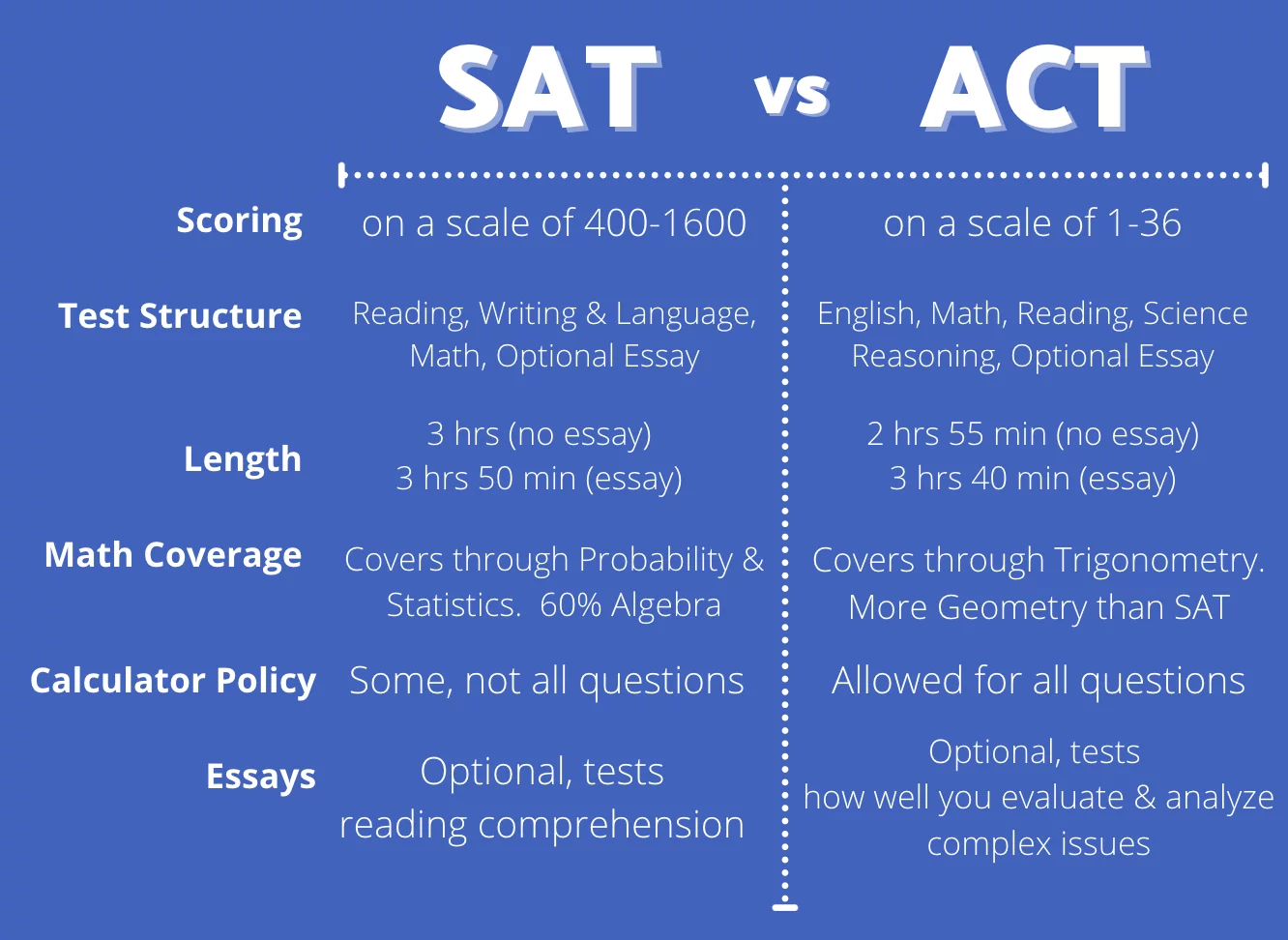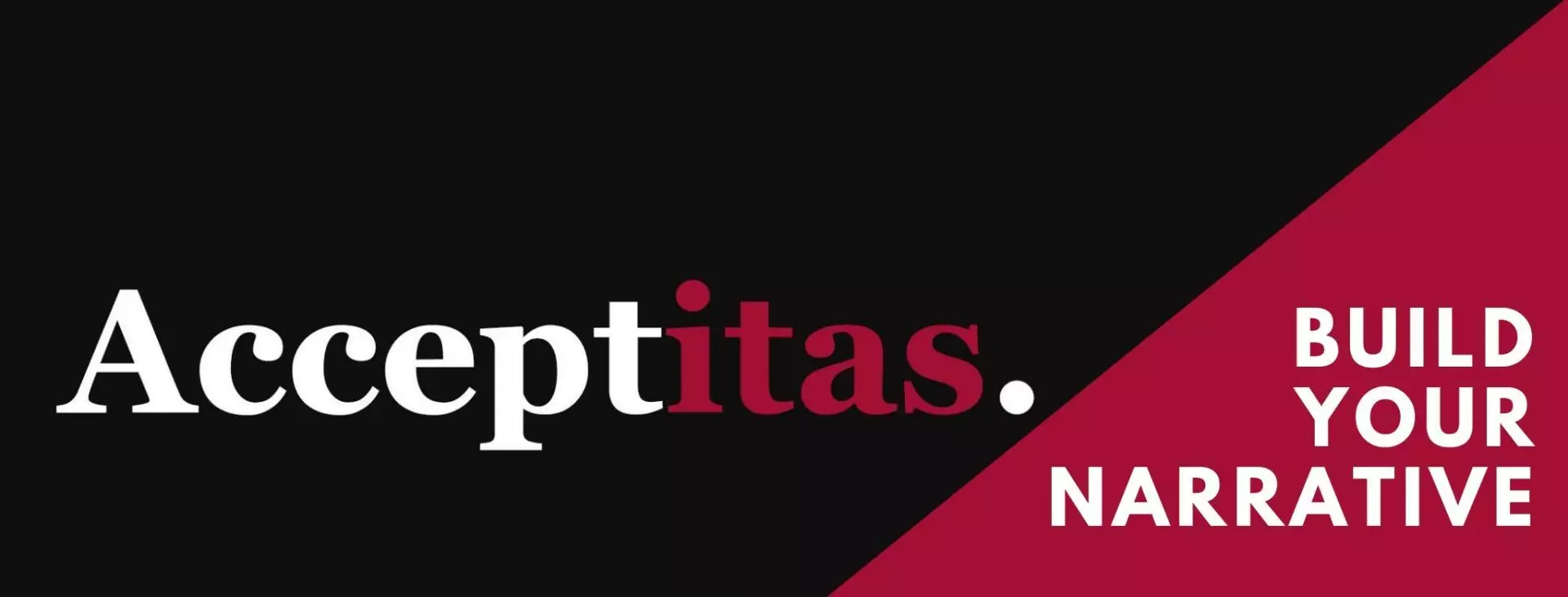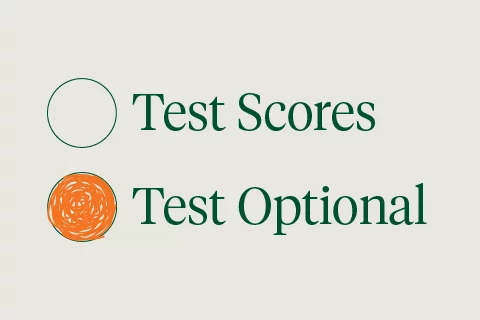When choosing to attend college, many students elect to take standardized exams to supplement their application materials.
Some schools require these tests, while others do not. There are two main tests for students applying for undergraduate studies—the SAT and ACT. While these tests measure similar aptitudes, they are different.
In this guest post, Kevin Organiciak, Founder and Chief Learning Officer over at TPAPT (The Association of Test Prep, Admissions, & Private Tutoring), dives into the SAT vs ACT and how to choose which standardized test is the right option for you.
First things first - let's go through the basics of both tests through this T-chart so you can get an idea of what each one has to offer:

The SAT is the most popular college entrance examination. This test measures student success in reading, writing and language, math, and essay skills. Contrary to what some believe, it is no better or worse than any other college entrance exam or requirement.
It is important to note that while some parts of the SAT allow students to use a calculator on the Math section, others do not. If you want to sharpen your math skills and get comfortable solving problems without a calculator, try it out with an AI-powered math tutor app. These apps can provide step-by-step explanations, adaptive learning paths, and instant feedback to help you master SAT math concepts.
The ACT is the other major standardized college entrance exam. While many students take the test each year, it is slightly less popular than the SAT.
As you can see from the T-chart above, the core subjects for the SAT and ACT are nearly the same, except the ACT also has a science reasoning section.
Overall, the ACT is slightly shorter. This test also allows you to use a calculator, but this time you can use it on all math sections. In terms of the scoring breakdown among the sections, each of the four sections is worth 25% of your final score, making them of equal weights.
Prior to 2016, any guesses made on the SAT were subject to be penalized if you guessed the wrong answer. However, it is important to note that now, there is no guessing penalty for either test, so once you narrow down those answer choices to as few as possible, guess away!
Colleges and universities that require entrance examinations do not have any preference to which test students take or submit.
You could theoretically take both tests, but that is an unnecessary undertaking.
Neither test is easier than its counterpart, so at the end of the day, you should settle on focusing your preparation efforts on the standardized test that you feel you will most excel at, given the parameters and constraints of each.

The first thing you should think about when deciding if you should pursue studying for the SAT or the ACT is which test will highlight your strengths more.
For students who are strong in Science and English subjects, the ACT might be more up your alley. However, if you're a student who struggles in science reasoning but you are strong in math, opting for the SAT may be a better choice.
Next, it's certainly helpful to consider factors other than academic strengths, such as your personal testing style, and the innate advantages and disadvantages of each test.
For example, if you're a whiz at answering a lot of questions in a short amount of time, consider the ACT instead of the SAT, because it is tighter on its constraints in terms of time per question.
Ultimately, the best way to actually go about deciding which test is best for you is to try out both by taking full-length practice tests and comparing your scores and percentiles.
The cost of taking the SAT and the ACT is essentially the same.
The SAT is $49.50 for Writing/ Reading/Math, and adding the essay portion drives the test up to $64.50.
Comparatively, the ACT costs $52 without the essay and $68 with the essay.
Luckily, for students with financial need, it is possible to obtain fee waivers for both the SAT and ACT. Eligibility requirements do vary, so check out these resources (SAT fee waiver info and ACT fee waiver info) to learn more about if you qualify and how to proceed.
Ultimately, the ACT and SAT are similar tests as far as costs, guessing penalties, and nationwide acceptance at colleges and universities.
Because the vast majority of colleges do not prefer one test over the other, you should only prepare for and take the test that you feel best plays to your strengths.
The first time someone hears that there are more than 36 million Americans who have started college but not yet finished, it often prompts a surprised look. We seemingly recognize that some people do not complete college, but would not expect that more than 10% of the total US population are in this situation, otherwise called the college completion crisis.
Once the magnitude of this situation sinks in, the next question people often ask is “Why did they end up stopping out?” This is a challenging question because it is so hard to give an answer that adequately describes the variety of circumstances faced across such a large group.
The best way of putting it that I have heard so far is this: “Students stopout because they have to, not because they want to.” This sentiment recognizes that none of the 36 million students enrolled with intentions of not finishing.
Yet we want to understand at a deeper level what circumstances put them in the position of having to stopout.

At ReUp Education, we work directly with these students to help them chart a path to returning. In the process of serving these students, we have been able to unlock the answer to this question of “why.”
ReUp uses a model developed specifically for the stopped out population that combines data, technology, and personalized success coaching.
Because the purpose of ReUp’s work is not only to help students return but ultimately to ensure their degree completion, the model is designed to address the obstacles that students face in order to re-enroll, as well as the challenges they face to complete their degree once they return.
These challenges are unique to each student, so in order for the support provided to be effective, it must be tailored and personalized.
This type of customized support is possible when the story of each student and their specific set of circumstances informs the approach.

As a part of ReUp’s model, students that have expressed an interest in discussing the possibility of finishing college are provided with a success coach who specializes in supporting returning students.
The coach has detailed conversations with the student that include a discussion of the events surrounding their departure from college. The coach uses this information to inform their ongoing personalized support of the student once they have returned.
A student who struggled to stay engaged with college because their personal network of friends and family did not include anyone who had a college degree needs a different support approach than a student who stopped-out because they became a parent and no longer had the bandwidth to focus on their education.
Knowing each specific story allows the coach to provide the personalized support that is needed.
ReUp’s methodology digs deeply into the reasons cited by students to ensure clarity of the root cause.
For example, if a student says that they stopped going to college because of financial reasons, the ReUp coach will ask follow-up questions in order to understand if money is really the root cause or if money is just the symptom of some other cause.
A student may at first say that they stopped out because of money, but with some follow-up, the discussion goes on to clarify that the financial issues were driven by the death of a parent, and the student needed to get a job to provide financial support for their siblings.

In addition to discussing the reasons a student left their institution before graduation, coaches also discuss the motivations compelling a student to desire to come back and finish.
In order to tease out what is driving each student to return, coaches ask questions such as “What would finishing this degree mean to you?” and “What would having this degree allow you to do?”
This information is critically important in informing the personalization of coaching provided to each student. When returning students have a difficult season, one key way for a coach to encourage their persistence is to remind them of their specific hopes and dreams for finishing college.
While one student may be driven by obtaining the earning power of a college degree, another student may have decided to return in order to be a role model for their family, and each of them benefits from the accountability of talking with someone who can help them keep perspective about why they wanted to come back.
Colleges that are partnering with ReUp are eager to better understand their stopped-out population. For this reason, ReUp periodically aggregates the individual student data and reports it back to partner institutions so that they can see the reasons why their students left and the reasons why they want to come back, as well as what barriers remain in the way of that path.
However, ReUp recognizes the value of looking at this data from an even larger perspective. In 2019, ReUp released the College Completion Report. In the report, ReUp shared for the first time the high-level reasons given for leaving college and returning to college in aggregate across the institutions ReUp serves.
Our hope in sharing this data is to help more people recognize the variety of circumstances faced by students who are faced with stopping out. We also believe that there’s an important silver lining in the work that we are doing - many of these students are coming back to finish.
We hope that by sharing their motivations for returning we represent the more complete story about these students’ educational journey: it doesn’t end when they stop out. These students are coming back to finish, and their experiences during their time stopped out are often a part of their reasoning.
Click here to download the report
Written by Andrew Lyle
Director of University Partnerships
ReUp Education
Grades. Essays. Extracurricular activities.
These are some of the usual responses that I get when I ask students the question “What is the most important part of your college application?”.
While these elements are without a doubt important, there is one thing that can elevate your college application above all else.

So what is a passion project and why should anyone care? Fair question. Broadly defined, a passion project is any independently student-founded and led project to achieve a specific goal or mission.
Some common examples include starting a non-profit charity, small business, or blog, building an online community around an issue, doing independent research, writing a book, etc.
A passion project can really be any initiative you take that shows your creativity, resourcefulness, motivation, and leadership ability surrounding a given topic or cause.
Because passion projects are generally perceived as being difficult and requiring a lot of personal motivation and guts, colleges treasure them when it comes to deciding who gets in and who wins the big scholarships.

In fact, a recent study done by Acceptitas showed that over 75% of current Harvard students completed a passion project in high school and felt that it significantly impacted their application. This phenomenon holds for other top schools and demonstrates that a thoughtful, carefully executed passion project is a common thread between students who get in and receive scholarships across the board.
In theory, this sounds awesome. But where, and how, do you start?
It’s no secret that building a passion project from scratch can be scary and also a huge time commitment. You’ve got a full plate of extracurricular activities and classes, so starting your own organization or project sounds overwhelming. Even if you have an idea, what are you supposed to do next?

Acceptitas is a near-peer mentorship service that provides students with 1-on-1 passion project development coaching from current Harvard undergraduates.
We help students build passion projects from scratch or vastly improve their current project. All of our curriculum and methods are based on studying the best practices of what makes a passion project successful. In our eyes, a successful project is personally fulfilling to work on, helps a significant number of people, and builds your college application narrative or “story.”
Acceptitas mentors break down the process into small actionable steps, taking the overwhelming task of creating a passion project and making it much more accessible and less time-consuming.
If you’re interested in starting a passion project, here are three steps to help get you started.
1) Ask yourself: what topic, issue, or problem am I passionate about?
Your passion project will need a concrete focus. This can be a topic such as “invasive plants” or a problem you have recognized within your community, such as “lack of mental health resources in my district’s schools.”
Pick a topic that genuinely excites you, that you are interested in learning more about, and making a difference in.
2) Write a mission statement.
After you know your topic, decide who is going to be impacted by your passion project, how you’re going to do it, and why. Each passion project should have a target audience, or people who will interact with it, such as volunteers or people who read your research.
Next, how are you going to reach these people? This could be through building an online presence and community, live events, fundraisers, etc.
Finally, why are you doing all this in the first place? What do you believe is a problem that needs more attention?
Once you have answered all of these questions, you can combine your responses to form a cohesive mission statement for your passion project.
3) Plan and host your first “event”.
The best way to learn is by doing! If your passion project is event or community-focused, then get started with your first event. It’s okay to start small the first time around. The important thing is that you start it!
If your passion project is some form of research, a written piece, or creativity-based, then your first “event” might be creating an outline for your project and creating the first section.
It’s time to get to it!
If you’re interested in working 1-on-1 with an experienced passion project mentor to take your passion project from idea to shining star on your college apps, go to acceptitas.com and sign up for a free consultation. For juniors and seniors, check out our complete college application program, Hack Your College Apps.
A new future and an awesome passion project await you.
This article was written by Emmet Halm, Founder of Acceptitas. Acceptitas is a near-peer mentoring service that helps high school students build passion projects and get into their dream schools.
Partially due to the widespread impacts of COVID-19, many colleges and universities (over 1,600 across the US, to be specific) are becoming test-optional institutions.
However, the term “test-optional” is quite nuanced.
Therefore, before diving into answering the question “Is Test-Optional Right for Me?”, I will start by going over the proper definition and breakdown.
Then, because there are many things to consider when choosing to apply to test-optional schools, I will provide you with some helpful information to guide you in successfully making that decision.

At its core, the term “test-optional” in relation to a college or university means that that school does not require some or all of its applicants to submit test scores in order to be considered for admission.
This means that scores from standardized tests such as the SAT or ACT are not required. However, other test scores, such as AP exams, would still be needed to verify credits earned.
Because test-optional schools do not factor your SAT or ACT into their decision-making model, they do put more weight on components such as level of rigor with classes taken, extracurricular activities, community service, and personal statements to make their decisions.
One key thing to note about schools that are test-optional is that many of them still use test scores to determine merit aid awards. So, if you are looking to potentially earn scholarships or grants from your school of choice, consider submitting a test score even if the school is test-optional.

It is important to point out the difference between a school that is “test-optional” and a school that is “test-blind”.
The term test-blind means that ACT and SAT scores will not be considered for admissions or merit aid. Test-blind schools will not even look at your scores if you do submit them.
Currently, approximately 65 schools across the US are completely test-blind; notable contributions to this list include the University of California school system.
Students who struggle with standardized test-taking may choose to go the test-optional route when applying to schools.
Maybe you have already taken both tests and decided that your scores were not an accurate reflection of your abilities and potential. If you didn’t do as well on either test as you would have liked, try to think about the alternatives you can offer on your application that may be able to supplement a lack of test scores. Students with artistic skills may also want to showcase those talents if their test scores do not make them stand out among other applicants.
Additionally, the impacts that the COVID-19 pandemic has had on some students' abilities to actually sit for these tests at testing centers is also another major reason why so many schools are now becoming test-optional.
So, if this sounds like you, then we suggest you definitely do some brainstorming and digging into ways that you can look to differentiate yourself from other applicants since you may not be able to submit a test score.
As mentioned above, students who choose to go test-optional can offer schools creative portfolios, including creative writing, drawings, photographs, sculptures, dance routines, or other artistic demonstrations.
Additionally, students may also choose to enroll in advanced classes (AP or IB), take SAT Subject Tests, or submit other educational evidence with their applications that prove they are strong students.
Each school has its own set of rules for who can use which applications and why. Some test-optional schools make submitting test scores optional for all students; other schools, however, have restrictions for who can use that route.
Sometimes schools allow students who choose to forego test scores and take placement tests to replace the standardized test scores in terms of helping students figure out which classes they should be starting out in to have the greatest chance of success.
Without an SAT or ACT score, the schools would not have adequate information to help students succeed. Therefore, placement tests are used to ensure that students are not taking classes that are too challenging for them from the get-go.
No one can answer what you should do, but you. However, we do recommend that you do your research and consider all the options that are available to you, given the circumstances.
First, take a look at the list of schools you are thinking about applying to and do some research on their admissions pages to find information on their policies regarding test-optional.
Once you have gone through all of the schools on your list and identified which category each school falls into, you will be able to better assess your options. This website offers a wealth of information and resources on test-optional and test-blind colleges and universities throughout the US - I highly suggest you check this out as well!
Next, consider taking the time to think about why you might be choosing to opt-out of standardized test requirements.
Do the new requirements make you seem less appealing to schools or more desirable? You should weigh your options and level of competitiveness at each school for which you want to apply, taking into account your profile with and without your test scores submitted. You might choose to skip the test scores at some schools and use them at others.
Ultimately, if you can improve your candidacy by submitting either an ACT or SAT score to a test-optional school, or if you are looking for merit-based aid (as most students are!), you should highly consider taking standardized tests and using those scores.
This guest blog post was contributed by Kevin Organiciak, Founder and Chief Learning Officer of TPAPT.
If you're looking for more reading on test-prep related topics, check out our other recent post on SAT vs ACT!
If I could engrain one piece of advice into anyone on a college campus, it would be to get involved! The best way to meet people just like you and make lifelong relationships, professionally and socially, is to find a club or organization that fits you. Here are five ways to find the most perfect way for you to get involved on campus.





Guest post by: Izzy Wallace